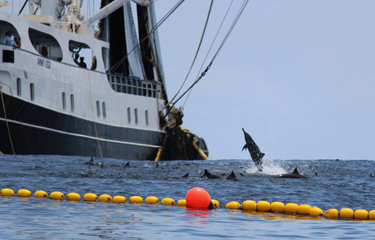Costa Rica’s Legislative Assembly has instituted a six-month delay on a bill that would have pushed Costa Rica’s tuna purse-seiners out to beyond 100 miles from its coast.
Costa Rica has no nationally-flagged tuna-fishing vessels, but allows vessels from Venezuela and Nicaragua to fish up to 9,000 metric tons (MT) of yellowfin tuna in its territorial waters, with the requirement that it all be processed at a canning facility in Puntarenas, Costa Rica.
The proposed legislation would have prohibited foreign-flagged tuna purse-seiners from fishing within 100 miles of Costa Rica’s coastline. It received initial approval in the Legislative Assembly in December 2020, but in March, it was pulled prior to a second vote, which would have sent it to Costa Rica President Carlos Alvarado Quesada for his signature or veto.
The bill was backed by the Costa Rican Fisheries Federation (FECOP), a non-profit that represents sport-fishing associations, as well as environmental non-governmental organization MarViva. FECOP said the law “would have given better protection to dolphins and other marine life that is captured as bycatch in the process of purse-seine tuna fishing in Costa Rica.”
Tuna purse-seiners operating in the Eastern Pacific Ocean typically fish for yellowfin tuna by identifying dolphin pods, as the two species swim together. According to FECOP, nearly 85 percent of purse-seine lances in Costa Rica involve the capture of dolphins, with an estimated 2,000 dying from the practice annually, though the fishing companies have implemented a system of dolphin release from the sets that allows most of the mammals to escape capture.
“The dolphin super pods are coastal animals and the [law] would save many from harassment or death,” FECOP said.
In 2014, Costa Rica passed a law that pushed tuna purse-seining to beyond 45 miles off its coast. FECOP said the move has resulted in a reduction of bycatch and an improvement in the population count of turtles, sharks, manta rays, and sportfish in the country’s coastal areas.
FECOP said the six-month delay in consideration of the law will “push the issue into the next electoral period and delay the process even further.
“Costa Rica is famous internationally for its ‘green image’ and has great protection in place for people interacting with dolphins,” FECOP said. “It doesn´t seem to feel the same way when it comes to tuna purse-seine boats fishing over them.”
FECOP also criticized the Inter-American Tropical Tuna Commission for its lack of decisive action on the issue and for its failure to reach consensus on the management of tropical tunas at its 2020 meeting.
Costa Rica’s legislature approved a separate change to its fishing laws in 2020 that would have allowed bottom-trawlers to begin operation inside of its exclusive economic zone, but the legislation was vetoed by President Alvarado in December, according to the Tico Times.
Photo courtesy of PRNewsfoto/FECOP Costa Rica







